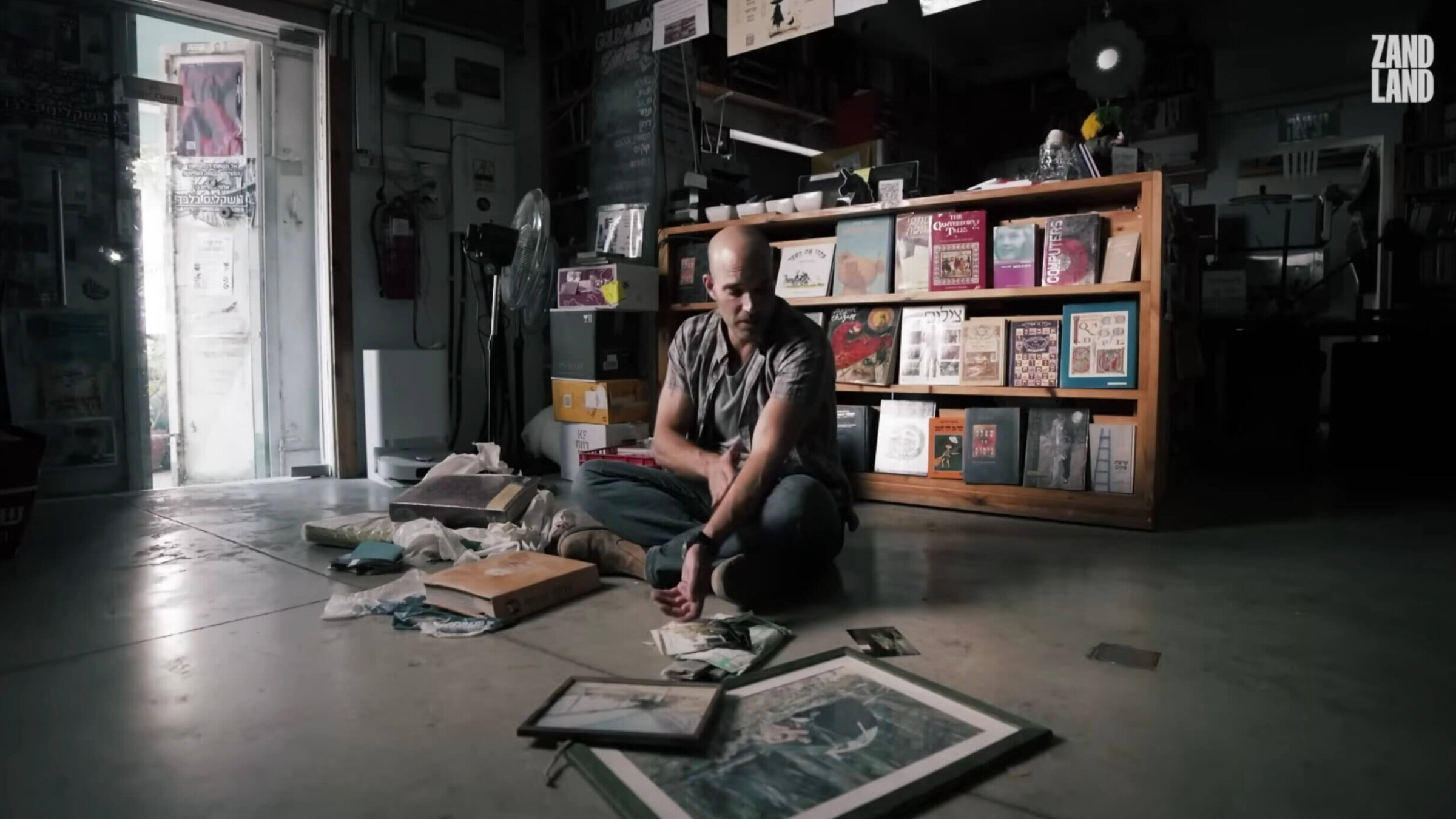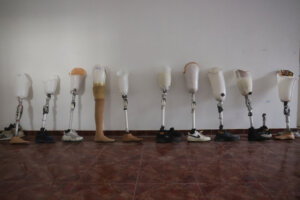A new documentary humanizes Israeli soldiers. It also alleges war crimes.
In ‘Breaking Ranks: Inside Israel’s War,’ IDF veterans reckon with their experiences in Gaza

Yuval Ben-Ari, an IDF reservist who served more than 50 days in Gaza, reflects on his service in a new documentary on the war. Screenshot of Breaking Ranks: Inside Israel’s War
An Israel Defense Forces combat veteran pores over photos of his swearing-in ceremony. He’s out of uniform, brow furrowed, plucking nervously at his goatee. His name is Yuval Ben-Ari, and he is here — on camera, using his real name — to tell us what he saw in Gaza.
“I don’t expect you to understand, but it’s emotional to look at these pictures after 20 years,” he says. “You’re proud that you’re a man now, that you’re responsible for the safety of Israel.”
Ben-Ari, who served in an infantry unit, is one of nearly a dozen soldiers who appear in Breaking Ranks: Inside Israel’s War, a new documentary from indie production company Zandland which streamed in the U.K. and can be viewed on YouTube. Four of the speakers appear on camera, identified by their real names; the rest are disguised and use aliases. Taken together, their testimonies are a scathing indictment of what Israeli Prime Minister Benjamin Netanyahu has called the “world’s most moral army.”
If their stories are true — and nearly everything the soldiers say has already been corroborated by other media reports — they are describing war crimes as the rule in Gaza, not the exception. Unarmed civilians are shot or bombed as a matter of course. Homes are torched without cause. Humanitarian aid sites are shelled out of sheer resentment. The people telling us this — young men and women who served hundreds of days in the territory over the past two years — are still reckoning with their role in the destruction.
Breaking Ranks is not the first documentary to be made about the war in Gaza, and it will not be the last. But it may be the only one to focus on the targeting of innocent Palestinians while also humanizing Israeli soldiers. The soldiers outline their belief in the IDF and the importance of the mission in Gaza. The film contextualizes the war, showing footage of the atrocities of Oct. 7 and noting that Hamas leaders, too, have been charged with war crimes in international courts. Palestinian casualty figures are provided, the film notes, by the “Hamas-run Gaza health ministry”; the tunnel network, it explains, is used for smuggling and warfare. It does not avoid discussing the 251 Israeli hostages.
Those elements ultimately strengthen the film’s argument about how the war was conducted. The picture that emerges is one of lawlessness and cruelty, coupled with a tolerance for collateral damage and a lack of accountability that runs counter to the IDF’s “Purity of Arms” statute. Yet that portrait also shows the rank-and-file — not all, but some — resisting the practices of their superiors.
A tank commander (“Daniel,” an alias) recounts a time his commander informed troops he planned to destroy a humanitarian aid building. The unit warned him the building was off-limits, but the commander shelled it anyway. Then — according to the soldier — the commander made up an excuse to justify the attack: “I had an anti-tank weapon pointed at me.”
A member of a different unit tells a similar story: When a man hanging laundry on the roof of a building is deemed a “spotter,” a commander shells the structure, killing and injuring many people inside. “This kind of thing happened every week,” says the soldier telling us this story. “And that’s just my unit.”
A platoon sergeant, using the alias “Yaakov,” tells how a pair of Palestinian teenage boys came to be his unit’s human shields, sent down into Gaza’s tunnels as scouts. The unit’s objections eventually won out — they cited international law — but Yaakov insists the IDF has a policy sanctioning the practice called “Mosquito Protocol.” (The Associated Press published an investigative report on the practice earlier this year; the IDF denies that it uses human shields.)
“I carried out these things,” says Yaakov. “I hope I can find a way to live without feeling shame with every step I take.”
One soldier says his unit once reported killing 112 people over the course of a deployment. Only one of the 112, he said, was even suspected of holding a weapon.

Not all of the soldiers recalling their enlistment in Breaking Ranks regret their participation. We meet Rabbi Avraham Zarbiv, who claims to have invented the tactic of razing entire Gaza neighborhoods, block by block, with a bulldozer. Another, given the alias “Lt. Col. F.,” says he would have happily pushed every Palestinian in Gaza into the ocean, given them snorkels and “let them swim to Egypt.”
Their hawkishness puts the defiance and disillusionment of soldiers like Yaakov in stark relief. And it raises questions as to why the IDF — which says it has launched dozens of Military Police investigations into alleged misconduct by soldiers — has not found more wrongdoing.
Ben-Ari, who admits that after Oct. 7 he was “consumed by rage and a desire to fight and avenge,” has since become a peace activist; he was injured last week in the West Bank, attacked by Israeli settlers, while accompanying Palestinians during the annual olive harvest.
He vows to never return to Gaza. But Ben-Ari will not quit the IDF entirely, either. Toward the end of the film, he says he would answer a call to protect Israel’s other borders because that is what he is trained to do, and because he still believes it’s necessary.
“This separation works for me,” he says. “I totally understand if people would say I’m a hypocrite, but this is my decision.”
















